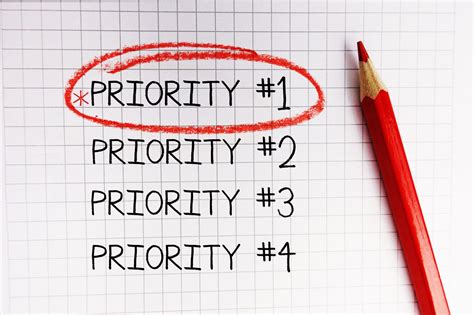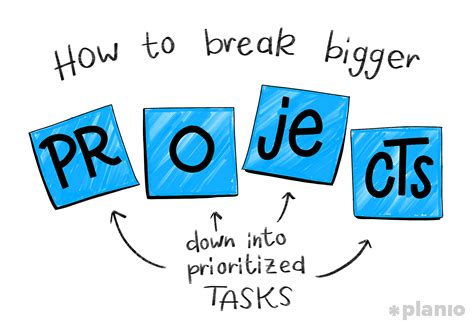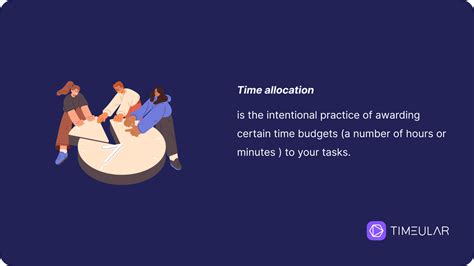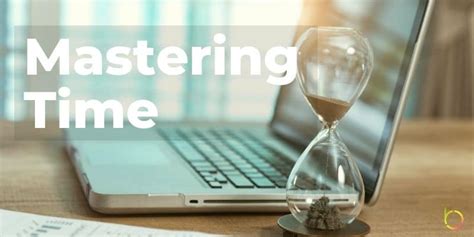In today's fast-paced and highly competitive business environment, the ability to effectively manage time is crucial for achieving success. With an endless stream of tasks and responsibilities demanding our attention, it's essential to develop strategies that enable us to make the most of our working hours. By employing a range of proven techniques and adopting a proactive mindset, professionals can optimize their productivity levels and enhance their overall job performance.
One fundamental aspect of efficient time management revolves around prioritization. By identifying and categorizing tasks based on their urgency and importance, individuals can allocate their time and energy more effectively. Additionally, employing effective delegation strategies can further enhance productivity, allowing professionals to focus their efforts on tasks that truly require their expertise. This not only facilitates better time utilization but also fosters a sense of teamwork and collaboration within the workplace.
Another key factor in effective time management is the ability to minimize distractions and maintain focus. With the advent of technology and the constant influx of notifications, it's easy to get sidetracked and lose valuable time. By implementing strategies such as setting specific periods for checking emails or turning off unnecessary notifications, individuals can create an environment conducive to deep work and uninterrupted concentration. Engaging in regular breaks and incorporating mindfulness techniques can also help combat mental fatigue and increase overall productivity.
Lastly, adopting a structured approach to organizing one's tasks and commitments is crucial for efficient time management. Utilizing tools such as to-do lists, productivity apps, or project management software can assist individuals in prioritizing and tracking their progress. Breaking down larger tasks into smaller, manageable steps not only reduces overwhelm but also provides a tangible sense of accomplishment as milestones are achieved. By incorporating these systems into their daily routine and making them a habit, professionals can optimize their workflow and enhance their ability to meet deadlines effectively.
Maximizing Productivity through Setting Priorities
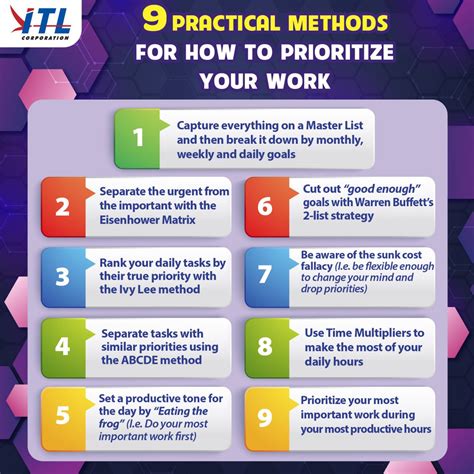
Efficiently managing your time at work is crucial for enhancing productivity and achieving success. By setting priorities effectively, you can optimize your workflow and accomplish tasks more efficiently. Prioritization involves identifying and organizing tasks according to their significance, urgency, and impact on your overall goals. This section provides valuable insights into setting priorities to maximize productivity and make the most of your time in the workplace.
Creating and Following a Daily Schedule
Organizing your daily activities and sticking to a structured routine can greatly enhance your ability to manage time effectively. By creating and following a daily schedule, you can prioritize tasks, allocate appropriate time for each activity, and stay focused throughout the day.
Designing a Structured Routine:
When developing your daily schedule, it's essential to determine your priorities and set achievable goals. Consider using a planner or digital calendar to map out your day, allocating specific time slots for different activities. Be sure to include both work-related tasks and personal commitments to achieve a balanced routine.
Setting Realistic Timeframes:
When assigning time blocks to your tasks, it's crucial to be realistic about how long each activity will take. Avoid overestimating or underestimating the time required, as it can throw off your entire schedule. Give yourself some flexibility by accounting for unexpected interruptions or delays.
Prioritizing and Allocating Time:
Begin your day by identifying the most important tasks that need to be completed and prioritize them accordingly. Allocate sufficient time for each task based on its importance and urgency. By focusing on high-priority activities first, you can ensure that essential work gets done without being overwhelmed by less critical tasks.
Minimizing Distractions:
Distractions can be detrimental to staying on track with your daily schedule. Take proactive steps to minimize common distractions such as turning off non-essential notifications on your devices, setting specific times for checking emails or social media, and creating a conducive work environment free from unnecessary disruptions.
Reviewing and Adjusting:
Regularly review your daily schedule to ensure that it aligns with your goals and priorities. As you gain insights into your time management strengths and weaknesses, make necessary adjustments to optimize your productivity. Experiment with different strategies to find what works best for you.
Following Through:
Creating a daily schedule is only effective if you commit to following it consistently. Develop discipline and hold yourself accountable for adhering to the planned routine. Resist the temptation to deviate from your schedule unless absolutely necessary, and recognize the value of the time you have allocated for each task.
By creating and following a well-designed daily schedule, you can enhance your productivity, reduce stress, and make the most of your time in the workplace.
Enhancing Focus through Time-Blocking Strategies
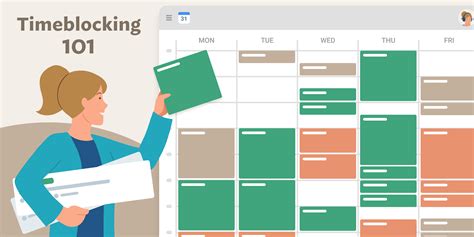
By implementing effective time-blocking techniques, individuals can greatly enhance their ability to concentrate and maintain focus during their workday. These techniques involve creating dedicated blocks of time for specific tasks, allowing for a more organized and efficient approach to daily work responsibilities.
One key aspect of time-blocking is the ability to prioritize tasks based on their importance and urgency. By identifying and assigning specific time blocks for high-priority tasks, individuals can ensure that these responsibilities receive the necessary attention and focus. This practice not only helps to prevent procrastination but also enables individuals to tackle challenging and critical tasks when their energy and concentration levels are at their highest.
Time-blocking also provides an opportunity to allocate periods for deep work, where distractions are minimized, and focus is maximized. By designating uninterrupted time blocks for demanding tasks that require concentration and creative thinking, individuals can enter a state of flow, enabling them to produce high-quality work and achieve optimal outcomes.
Additionally, time-blocking allows for better productivity by preventing multitasking and promoting single-tasking. Rather than attempting to juggle multiple tasks simultaneously, individuals can allocate specific periods for each task, allowing them to give undivided attention to one task at a time. This focused approach reduces the cognitive load, enhances productivity, and improves the overall quality of work.
Furthermore, incorporating breaks within time blocks is essential for maximizing focus and preventing burnout. By scheduling short breaks between tasks, individuals can recharge their mental energy, minimize decision fatigue, and maintain prolonged concentration throughout the day. These breaks provide an opportunity to rest, refresh, and refocus, resulting in improved efficiency and effectiveness.
In conclusion, utilizing time-blocking techniques empowers individuals to enhance focus, prioritize tasks, engage in deep work, promote single-tasking, and optimize productivity. By implementing these strategies, individuals can effectively manage their time and achieve greater success in the workplace.
Delegating Tasks to Enhance Time Efficiency
Improving productivity and achieving optimal time management in the corporate environment can be facilitated through effective task delegation. By assigning appropriate tasks to team members and leveraging their skills and expertise, organizations can maximize efficiency, streamline processes, and meet deadlines more effectively.
One technique for enhancing time efficiency is to delegate tasks based on individual strengths and capabilities. Assessing the skills and competencies of team members enables managers to assign tasks that align with their expertise, thus ensuring that each task is completed efficiently and to a high standard. Delegating tasks in this manner enhances overall productivity by capitalizing on the diverse talents within the team.
Another benefit of delegating tasks is that it allows managers to focus on higher-level responsibilities and strategic decision-making. By entrusting certain tasks to capable team members, managers can free up their time and attention for more critical and complex priorities. This not only empowers team members by providing opportunities for growth and development but also ensures that the manager's time is effectively utilized.
- Enhances productivity by leveraging the skills of team members
- Allows managers to focus on strategic priorities
- Offers opportunities for development and growth within the team
- Optimizes time management and ensures timely completion of tasks
- Encourages collaboration and fosters a sense of ownership among team members
To effectively delegate tasks and optimize time efficiency, clear communication and setting expectations are crucial. Managers should clearly communicate the objectives, deadlines, and expectations associated with each task to the assigned team member. Regular check-ins and feedback sessions can also help ensure that tasks are progressing as planned and provide an opportunity for clarification or adjustment if necessary.
In conclusion, delegating tasks based on strengths and capabilities not only enhances time efficiency but also promotes collaboration and fosters a sense of ownership within the team. By effectively assigning tasks, organizations can leverage the skills of their team members, allowing managers to focus on strategic priorities and achieve productivity gains.
FAQ
What are some effective time management strategies for the workplace?
There are several effective time management strategies that can be implemented in the workplace. One strategy is to prioritize tasks and create a to-do list. This helps in focusing on important tasks first and ensuring their timely completion. Another strategy is to avoid multitasking and instead, focus on one task at a time. This helps in maintaining concentration and productivity. Additionally, setting deadlines for tasks and breaking them into smaller, manageable chunks can contribute to effective time management. Regular breaks and proper delegation of tasks are also important strategies to enhance productivity and manage time effectively in the workplace.
How can I prioritize my tasks effectively to manage time efficiently in the workplace?
Prioritizing tasks effectively is crucial in managing time efficiently in the workplace. One way to do this is by using the Eisenhower Matrix. This matrix divides tasks into four categories: urgent and important, important but not urgent, urgent but not important, and neither urgent nor important. By categorizing tasks using this matrix, you can identify and focus on tasks that are both urgent and important, ensuring their timely completion. It is also important to consider deadlines, resources required, and the impact of each task to determine its priority. Regularly reviewing and updating task priorities is essential to effective time management in the workplace.
What are the benefits of effective time management in the workplace?
Effective time management in the workplace offers several benefits. Firstly, it increases productivity as tasks are completed efficiently and timely. This leads to reduced stress and improved job satisfaction. Effective time management also enhances work-life balance, allowing individuals to have more time for personal activities and leisure. It also improves decision-making and problem-solving abilities as individuals have more time to analyze situations. Additionally, effective time management helps in meeting deadlines, increasing customer satisfaction, and improving overall organizational efficiency.
How can I avoid distractions and maintain focus in the workplace?
Avoiding distractions and maintaining focus is essential for effective time management in the workplace. One strategy is to eliminate or minimize external distractions, such as turning off social media notifications, closing unnecessary browser tabs, or finding a quiet workspace. Setting clear boundaries with colleagues and asking for uninterrupted time can also help in maintaining focus. Prioritizing tasks and breaking them into smaller, manageable chunks can prevent overwhelm and improve concentration. It is also beneficial to schedule regular breaks to recharge, as long periods of continuous work can lead to reduced focus.
How can effective time management contribute to career growth and success?
Effective time management plays a crucial role in career growth and success. It helps in demonstrating reliability and professionalism by consistently meeting deadlines and fulfilling commitments. When time is managed efficiently, individuals have more opportunities to take on additional responsibilities, showcase their skills, and take up new projects. It also allows for better planning and prioritization, enabling individuals to allocate time for skill development, networking, and career advancement activities. Effective time management leads to increased productivity, improved performance, and better work-life balance, all of which contribute to career growth and success.
What are some effective techniques for managing time in the workplace?
Some effective techniques for managing time in the workplace include prioritizing tasks, setting goals and deadlines, minimizing distractions, delegating tasks when possible, and maintaining a well-organized schedule.
How can I better prioritize my tasks and manage my time effectively?
To better prioritize tasks and manage time effectively, you can start by making a to-do list and categorizing tasks based on urgency and importance. Identify the most critical tasks and allocate time slots for each. Additionally, consider using time management tools or techniques such as the Pomodoro Technique, where you work in focused intervals followed by short breaks.
